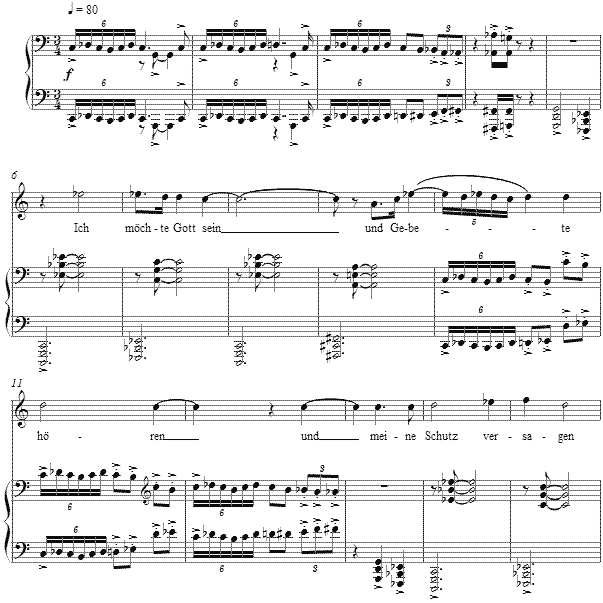Music and Texts of GARY BACHLUND
Vocal Music | Piano | Organ | Chamber Music | Orchestral | Articles and Commentary | Poems and Stories | Miscellany | FAQs
Ich möchte Gott sein - (2009)
Erich Kurt Mühsam
for high voice and piano
Ich möchte Gott sein und Gebete hören
und meine Schutz versagen können
und Menschenherzen zunichte brennen
und Seelenopfer begehren.
Und möchte Erde, Welt und All vernichten
und Trümmerhaufen über Trümmer schichten.
Dann müßte ein Neues entstehn -
und das ließ ich wieder vergehn.[ 4 pages, circa 2' 45" ]
Erich Kurt Mühsam (in a 1915 sketch by Pfeil)
I would be God and hear prayers
And be able to deny my protection
And burn to ruins men's hearts
And require the sacrifice of souls.
And exterminate land, world and all
And stack up rubble upon rubble.
Then could a new world rise --
And then I allow myself to pass away.
gb
The despair over religious belief as fostered by the major European wars, by advancing Marxist theory which announced religion the "opiate of the masses," and Nietzsche's announcement that "God is dead," the early twentieth century was marked by a kind of negativity in which the destruction of God by people whose forbearers were religious was fostered. Mühsam ironically places the notion of godlike power used to abrogate godlike power. This was a theme like unto the "twilight" of gods as a theme, but as later authors like Ray Bradbury led us to conclude, much of fiction -- whether about gods or space aliens -- ultimately is about mankind and man's own views of his own stories. This story is of the lust for power twinned to an abrogation of life, such as one finds in the modern political dialogue as well. Examples of this include the "culture of death" as bragged about by Hamas and the "shrink your carbon footprint" of the environmental movement which has led to self-abrogation such as a report from Britain in which voluntary removal of a uterus was offered as sacrifice to "saving the earth." Each of these comes to the same end of the story as Mühsam's text which ends in a lust for self-abrogation. For this, his poem is taken from the collection titled Wüste, or Wasteland.
The story line is prophetic, when one considers the secular lust of dictators such as Hitler, whose policies led directly to the extermination of the poet. It was this dictator, one among many, who were for a time able to "burn to ruin men's hearts" and "require the sacrifice of souls." It was this notion of "a new world" which ended in Hitler's passing away into history as among the most evil of modern men.
A musical raging opens the setting which leads to the opening statement in C minor decorated with chromatic gestures.
The augmented arpeggios as coloration in a second motif heighten the raging of the speaker. At the moment when self-abrogation is announced, the loud dynamics and higher tessitura yield to the lowest range and dynamic as the setting leads to the lowered super tonic, before falling back into the tonic of the setting and the repeated statement of "I would like to...." It must be repeated, because as much as one would wish for this, it is closed to the raging mind which can imagine but not act on this notion.
The score for Ich möchte Gott sein is available as a free PDF download, though any major commercial performance or recording of the work is prohibited without prior arrangement with the composer. Click on the graphic below for this piano-vocal score.


